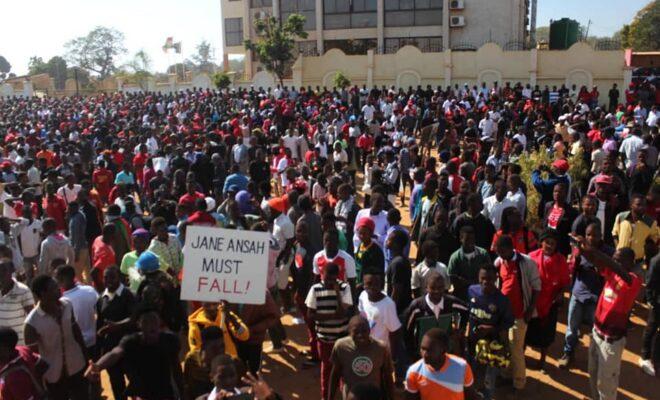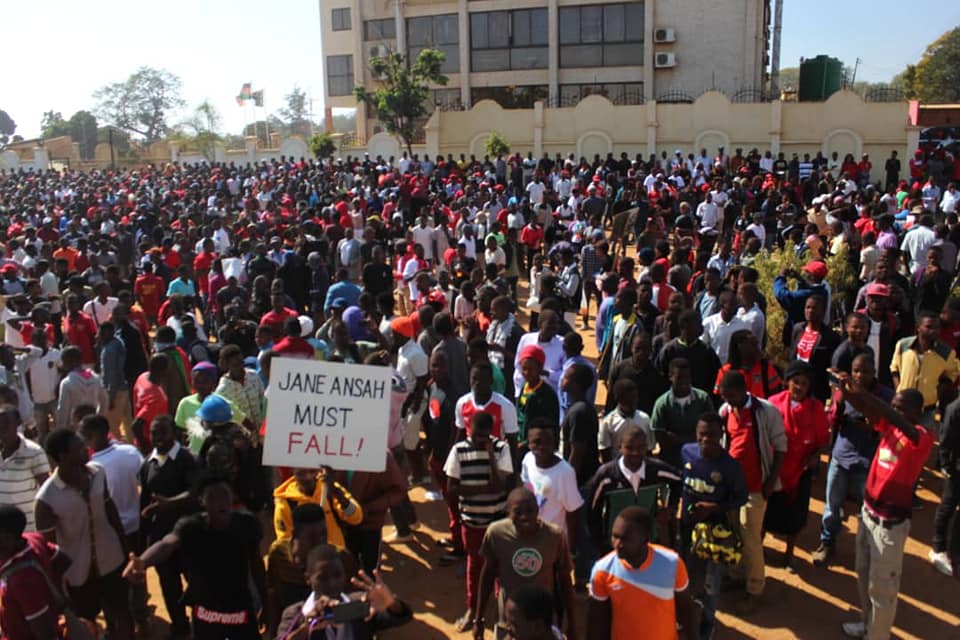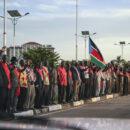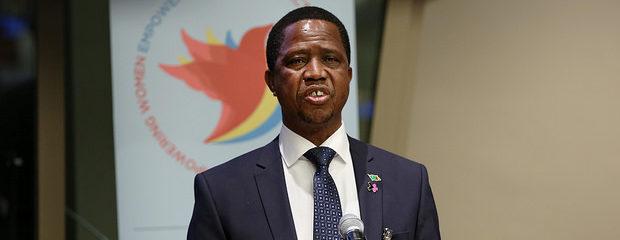“It’s the year of mass protests”: Malawi awaits crucial election ruling

Since the disputed 2019 election, Malawi has seen widespread protests over many issues. This is unlikely to change after the court’s verdict on the poll.

Protesters demand the resignation of electoral commission chair Jane Ansah in June 2019. Credit: SKCofficialpage.
Barely a week into 2020, thousands of Malawians thronged to the streets of the capital Lilongwe in what has become a familiar scene recently. This demonstration called for the prosecution of police officers accused of sexually assaulting protesters, but there have been many more like it with different demands over the past year. There could be many more to come. As Gift Trapence, vice-chairperson of the umbrella group Human Rights Defenders Coalition (HRDC), which has been behind many of the rallies, declared ahead of the 9 January demonstration: “This year, it’s the year of mass protests.”
According to campaigners, the level of protest in 2019 was unprecedented for Malawi with demonstrations ranging from organised large-scale marches to smaller spontaneous outbursts. In just the last couple of months, for instance, teachers, sanitation workers, truck drivers and airline staff have all held separate strikes. In October, police used teargas against students protesting against an alleged land grab. In November, Muslim and Christian protesters clashed after a school run by an Anglican Church banned girls from wearing hijabs.
On several recent occasions, people have also protested outside police stations demanding to take justice into their own hands. In November, police in Blantyre had to deploy teargas to disperse rioters demanding the release of a man suspected of killing a young boy; a few days later, a similar incident in Lilongwe ended with a mob killing a murder suspect after forcing police to relinquish him from custody.
The bulk of protests over the past year, however, have been related to Malawi’s heavily disputed May 2019 elections. In the presidential contest, incumbent Peter Mutharika officially won, in the first-past-the-post system, with 38.57%. But the opposition claimed the poll had been fraudulent citing, among other things, the alleged use of Tippex to change vote tallies.
Activists accused Jane Ansah, chair of the Malawi Electoral Commission, of presiding over a rigged poll and called on her to resign. In the mass protests that followed in May, June and July, dozens of protesters were killed and millions of dollars-worth of property was damaged.
The opposition also petitioned the constitutional court, which is due to deliver its verdict over the legitimacy of the elections by 3 February.
Distrust and discontentment
According to some Malawians, the rise in demonstrations over various different issues reflects a general lack of trust in the government and the country’s institutions. At the 9 January rally, several protesters expressed a wide range of grievances – such as the rising costs of living, corruption and drug shortages – well beyond the scope of the specific demonstration.
“I and many of the people here don’t recognise the legitimacy of this government,” said student John Phiri, 25. “There are so many issues that the leaders are failing to address and that is the reason I’ve been taking part in these demonstrations.”
Taxi driver Patrick Makamu, 40, added that many people have lost trust in politicians and officials. Among other things, he suggested that those in power are now pitting Malawians against one another for their own benefit. “There is tension in this country and the most dangerous thing is that leaders are turning us against one another based on our ethnicity,” he said.
Edge Fidelis Kanyongolo, a law expert at the University of Malawi, says that anger at the justice and policing system, “especially where such systems are considered biased or corrupt” have contributed to recent instances of mob justice.
Political scientist Ernest Thindwa echoes these ideas. He suggests the rise in protests over both election-related issues and other grievances is a result of people lacking faith in authorities to act in the public interest and feeling disenfranchised.
“The majority of Malawians, as shown by the recent polls, don’t support the current government,” he says.
More to come
The constitutional court’s panel of five judges has finished hearing the petition and is set to announce its verdict in early February. While some hope this will draw a line under Malawi’s recent uncertainty, others are sceptical that the highly-politicised case will ease tensions. Earlier this month, the Chief Justice complained to the Malawi Anti-Corruption Bureau (ACB) that bribes had been offered to the five judges. Following investigations, the ACB arrested the owner of FDH Bank Thom Mpinganjira and has said more figures are being probed.
Domestic civil society organisations and foreign governments have urged political parties to urge restraint among their followers after the outcome. The two main opposition parties, the Malawi Congress Party (MCP) and United Transformation Movement (UTM), have heeded this message and called on supporters to peacefully respect the verdict. President Mutharika has called generally for peace too, but while also intensifying his criticism of protests and their organisers. In his new year’s address, he remarked: “HRDC is a political organisation which is slowly degenerating into a terrorist organisation.”
This is the first time Malawi has gone to the courts following a disputed election result. It presents a serious test for both the country’s democracy and the independence of its judiciary. Whatever the verdict, however, many warn that Malawi’s era of protests is set to continue.
“The future does not look promising since the country does not have an ingredient for the peaceful reception of the judgement,” says Thindwa.





